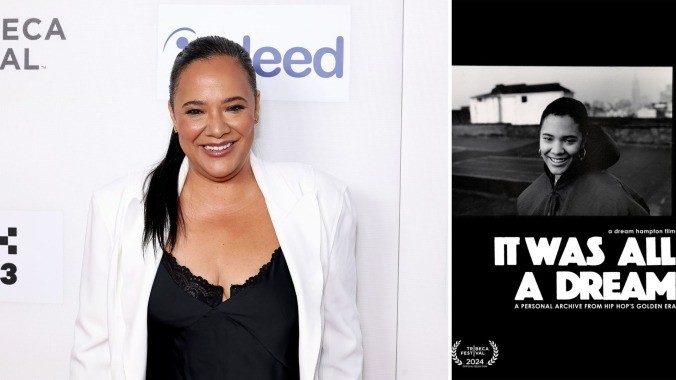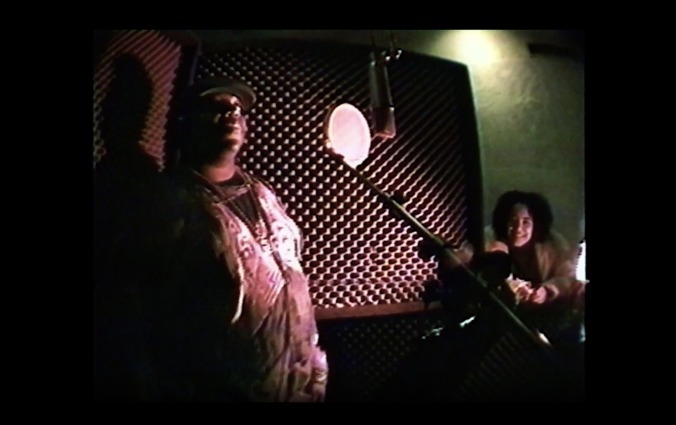In a New Doc, dream hampton Looks Back at the Hip-Hop She Fell in (and Out) of Love With
In an interview with Jezebel, hampton spoke about hip hop's "golden era," breaking up with the genre, and whether or not anyone can actually separate art from the artist.
Photo: Getty Images Entertainment
Not so long ago, there was a time in which Peabody Award-winning filmmaker, producer, writer, and noted not-music journalist, dream hampton, loved hip-hop. It was a moment before artists could simply sound off on social media; when storytelling and hard stances were reserved for records, and before she began studying feminist theory.
Now, hampton doesn’t care much for the genre. She’s never heard a Kanye West album, nor does she have an opinion on the Kendrick vs. Drake feud. In fact, she doesn’t think much about hip-hop at all. The one exception is her new film, It Was All A Dream, which sees a 22-year-old hampton filming a few old friends on the cusp of becoming some of the greatest artists of a generation—namely, Christopher “Biggie Smalls” Wallace. The film takes place from 1993-1995, after hampton took a documentary filmmaking class at NYU and began to realize her own potential as a passionate—and later, principal—critic of the genre. Since its premiere at the Tribeca Film Festival, It Was All a Dream has been lauded by critics as “the right documentary for right now” and a “nostalgic, nascent Trojan horse” for the questions no one can easily answer about hip-hop.
By now, it’s well-documented that asking audiences to sit with such exacting questions is one of hampton’s skills as a storyteller. In 2019, she received acclaim as a producer for Surviving R. Kelly, the six-part series that drew in over 26 million viewers with its debut and ultimately, played an undoubtable role in holding its subject to account once and for all. Long before that though, hampton cut her teeth writing about the evolving landscape of the hip-hop genre in the nineties and its heavy hitters for publications like The Source and The Village Voice. Her incisive essays, like this one on Dr. Dre’s 1991 assault of singer Dee Barnes, or her memoriam of Tupac, laid bare the genre’s sins while simultaneously challenging its arbiters to be better for those who loved it as she did.
In It Was All a Dream, you won’t find any one meditation on misogynoir, or the myriad ways Wallace, Snoop Dogg (Calvin Cordozar Broadus Jr.), Diddy (Sean Combs), or any other rap titans were toxic, however. There is, quite notably, no hand-holding narration or over-produced confessionals. Only an intimate, informal, and occasionally unflattering snapshot—overlaid with excerpts from hampton’s illustrious body of work for The Source—of some men she grew up with and ultimately, without.
On a recent Zoom call, hampton spoke to Jezebel about revisiting the “golden era,” breaking up with the genre, and whether or not anyone can ever really “separate art from the artist.” This interview has been edited and condensed for clarity.
I read that you found all this footage in a storage unit while moving your daughter across the country. What was your first reaction while rediscovering these memories?
So many of our memories are connected to photographs, or video, if you’re a certain generation. It’s like, “Do you remember that birthday party? Or do you remember the pictures of that birthday party?” That’s one of those existential questions that I’m constantly thinking about when it comes to documentation and memory. The truth is, until I saw some of this footage, I forgot that it happened. Of course, I remember being in the studio with Snoop when he was working on Doggy Style. Of course, I remember Biggie because I’d licensed some of that footage before, but only in snippets. Even looking at that footage of Biggie–which I absolutely did not forget I had–I forgot what our back and forth was like. Friends become that way when they pass on. It’s like, you have these 10 stories that you tell over and over again; then you begin to question those memories. So, to see our relationship preserved–we had an everyday, six-year-kind-of-conversation happening–I think the familiarity that we have is there, but you can also see that he’s very aware of being filmed in some moments. Like, he doesn’t want me to call him Christopher on camera. I forgot about all of that back and forth. So, there was a discovery process for me. I certainly haven’t looked at 22-year-old or 23-year-old dream since like…ever. To go back and revisit her was awesome. It’s its own journey.
It’s important to note that though you’re often mischaracterized as a “music journalist,” you’re actually a filmmaker–and a filmmaker who just happened to come of age with all of these rap gods. As someone who’s a multifaceted storyteller, the level of intimacy seen in It Was All a Dream between you and these artists is kind of unprecedented today, no?
-

-

-

-

-

-

-

-

-

-

-

-

-

-

-

-

-

-

-

-

-

-

-

-

-

-

-

-

-

-

-

-

-

-

-

-

-

-

-

-









































